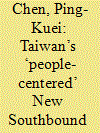| Srl | Item |
| 1 |
ID:
124076


|
|
|
| 2 |
ID:
173988


|
|
|
|
|
| Summary/Abstract |
This paper examines the implications of the United States’ “hub-and-spoke” alliance system in Asia. It argues that the US enjoys a bargaining advantage in the current bilateral security relations with its Asian allies. In contrast to a multilateral alliance, the US can better prevent free riders and joint resistance in its bilateral relations. It can effectively restrain the behavior of its allies and compel them to accommodate American interests. The hub-and-spoke system helps the US consolidate its policy influence over the Asian allies, supervise inter-alliance cooperation, and increase defense cooperation between allies and non-allies. This paper uses episodes of defense cooperation between the US, Japan, South Korea, Australia, and India to illustrate the American alliance management techniques since 2016. During this time, the US allies have increasingly participated in regional security affairs due to US demands and guidance rather than autonomous decisions. Facing strong US pressure, allies have found it hard to challenge the US under the hub-and-spoke system despite common grievances. This leads to two implications for the future: First, the US allies may have less autonomy in their foreign policies, restraining their ability to pursue neutral positions and policies in regional affairs such as the South China Sea dispute. Second, the US may discourage or even undermine the emergence of multilateral security institutions in Asia. The US is likely to maintain the “hub-and-spoke” system to safeguard its strategic interests in the Indo-Pacific.
|
|
|
|
|
|
|
|
|
|
|
|
|
|
|
|
| 3 |
ID:
174737


|
|
|
|
|
| Summary/Abstract |
Taiwan’s relations with South and Southeast Asia have become the focus of scholarly discussion since it proposed the New Southbound Policy (NSP) in 2016. Few touch on the NSP’s effect on Taiwan’s relations with countries outside the NSP targets. This paper argues that the NSP has a positive effect on US–Taiwan relations. The people-centered approach of the NSP helps the Taiwanese government create a credible commitment to a moderate foreign policy. It signals Taiwan’s resolve to uphold the US interests in Taiwan Strait. Taiwan’s policy direction has received the US’s approval, resulting in cordial US–Taiwan relations. The public supports from the US have strengthened Taiwan’s confidence under tense cross-Strait relations. Recently, the US’s Indo-Pacific strategy provides Taiwan an opportunity to establish a closer tie with the US. But the prospect of bilateral cooperation in the Indo-Pacific region depends on a clear proposal.
|
|
|
|
|
|
|
|
|
|
|
|
|
|
|
|